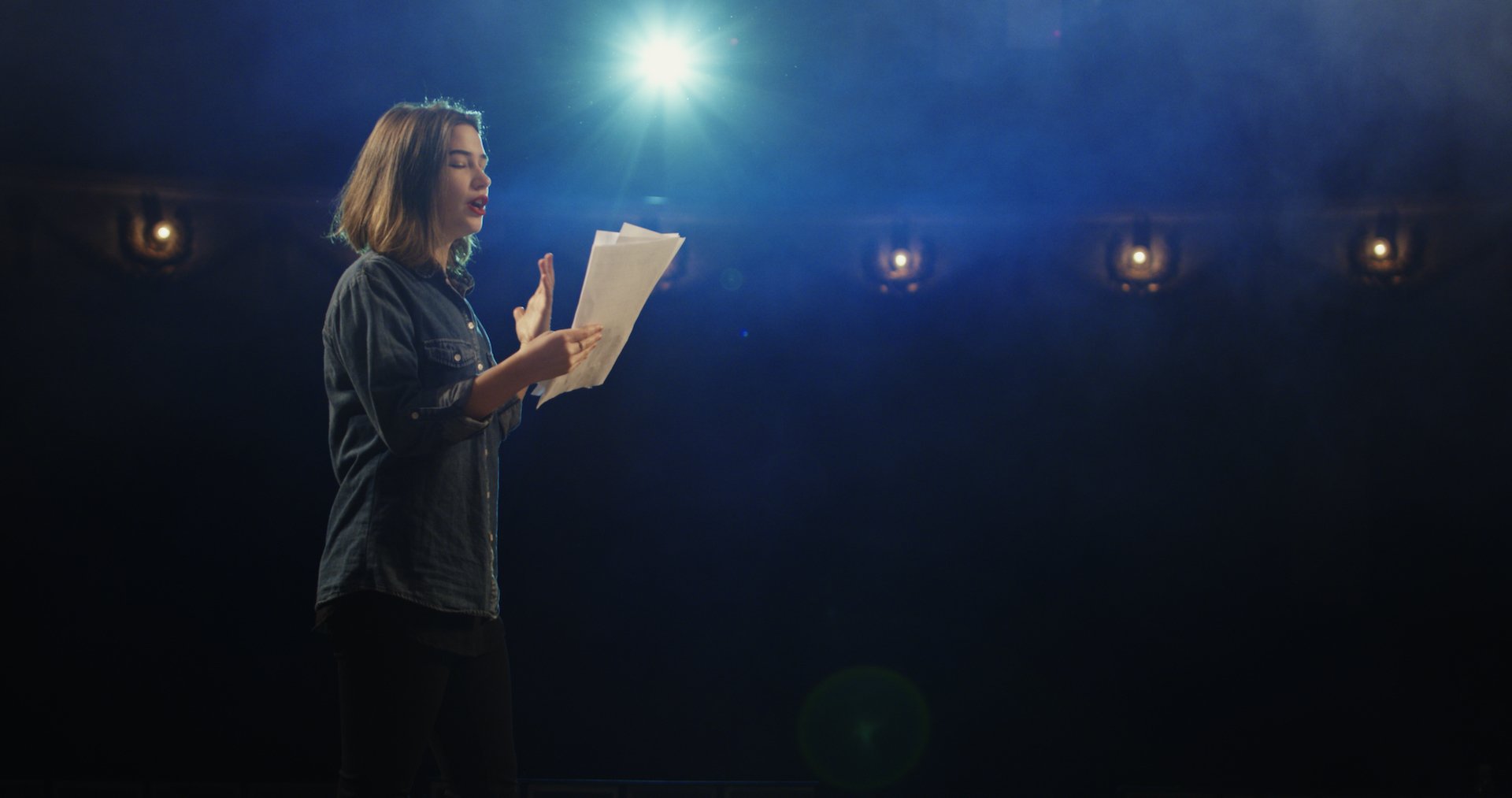
Screen Acting Basics
Below we take a look at a few screen acting basics. Screen acting is growing increasingly important for actors. The number one bit of advice: get in front of a camera as much as possible. Like with any aspect of acting, getting comfortable and relaxed is the key to success—especially when your first time on a film set can be a bit of a whirlwind experience! Learn to trust in your own skills and remember that you’re there to bring a character to life: everything else is a support at best, and a distraction at worst. Focus on being mindful, working on your character in the context of the scene and the rest will fall into place.
Become Self-Aware
The first step to improving your on-screen acting is to improve your everyday self-awareness. A thorough understanding of how you react to different situations in life will allow you to react naturally on screen. I’m not saying you should be constantly thinking of improving your screen acting while going about your day; the opposite in fact. Go about your business and check in every now and then with your mind and body.
Are you stressed out? Happy? Tense? Angry? A mixture of everything? Did you react to an event in your life the way you would expect a character to react on screen? Do your acting choices reflect your life choices? The way you react to change in real life is what will make your performance unique so don’t change a thing… unless a director tells you to.
Rehearse Away From Camera
Using all of that self-awareness, grab your script and start rehearsing away from the camera. If you’re not able to rehearse with your scene partner, ask a friend. Yes, your performance will (and should!) vary depending on who you are working with. But, any rehearsal without the pressure of a camera in your face is valuable.
In front of the camera, actors will often simplify their characters to one emotion. For example “My character is angry with her.” or “She hates him.”. Without the excuse of a camera, these choices don’t work. While rehearsing away from camera, you are forced to find the reason your character is still in the scene: finding your objective is just as important on screen as it is on stage or in an acting class! Approaching the scene from your character’s objective, rather than the mentality of “this is when I cry/yell/tear off my shirt” also helps you identify the stakes in the scene. What does your character have to gain? What do they have to lose? A self-aware actor rehearsing away from camera should look like a normal person living life. Do you?
Know The Script
We spend a lot of time talking about the importance of script analysis here at StageMilk; while it might seem like an odd thing to do when you’re shooting a film out of order, or only appear in a few sporadic scenes, it is vital that you develop a comprehensive understanding of how the script fits together. Don’t just read the scenes you appear in: take the whole story in and know what part you play. Again, this will help you determine what the stakes are in your scenes—as the context should prove illuminating.
Too many actors think that aspects of their job such as characterisation, motivation and objective are the responsibility of the director. All you need to do is show up and they’ll tell you where to stand, what to say, how and why! By all means: count on the director having a hot take. But think about what you can bring to the set. Screen acting, while a more controlled and technical process than theatre acting, is still an artistic, collaborative process. Having a plan in mind for when you arrive on set will improve your acting—even by the simple effect of boosting your confidence by way of a strong attack plan.
Breathe, Focus And Transfer
Okay, so you are self-aware, rehearsed and you know the material. Now it’s time to transfer that performance onto the set. If it’s an audition or green screen work, try your best to imagine all of the physical given circumstances. Who are you? Where are you? What can you see? Who are you talking to? And who can hear/see you? Is the conversation public or private? What do you want from this person? And why? All of these questions will influence and improve your on screen acting.
If you are on set surrounded by extras and other performers, become self-aware in that moment. Listen, touch, taste, and see the world around you. Now ask yourself: what does my character have to win and lose in the scene? Imagine the best and worst outcomes (love/hate, life/death). And now the scariest part of it all … let it go. Breathe, relax, and act.
Trust And Respect Your Team
For any actor stepping onto their first big set (or any set, for that matter), they might suddenly find themselves part of a strange and, at times, impenetrable world. There’s new lingo to learn, safety protocols to follow that range from trivial to life-saving. Some people aren’t allowed to talk to the director. And the director can’t talk to certain actors! Also, for an industry so time-poor, you will do a lot of waiting around on set. Like, a lot of waiting.
Take the time to learn about the strange world of film sets. And while you’re at it: learn the names and roles of your collaborators—not just fellow actors and ‘above the line’ crew (a phrase that definitely belongs in the bin in the 2020s). If you respect them and their jobs on-set, you’ll have a far more successful time getting your best work out of yourself and into the camera.
When It Comes To Acting, You Are The On-Set Expert
We weren’t kidding when we called the on-set experience somewhat overwhelming—especially if you don’t have much screen experience, or find yourself stepping up to something bigger or more professional than you’ve previously worked on. It’s sometimes exciting, sometimes chaotic, always high-pressure. So when you find yourself starting to get nervous, second-guessing your choices or choices, just remember that when it comes to acting: you are the expert. You’re the person they brought in to do the job nobody else on set could do—not the wealthy producer, not the hotshot director, not the perfectionist DOP.
Know and respect how you fit into the film crew ecosystem … but never forget that without you it’s a bunch of cameras, empty sets and catering trucks. If you’re standing there, you’ve earned it. Now it’s time to enjoy it!
amzn_assoc_placement = “adunit0”;
amzn_assoc_enable_interest_ads = “true”;
amzn_assoc_tracking_id = “stag01d-20”;
amzn_assoc_ad_mode = “auto”;
amzn_assoc_ad_type = “smart”;
amzn_assoc_marketplace = “amazon”;
amzn_assoc_region = “US”;
amzn_assoc_linkid = “a83f98d176f88f3b1a3d3d57f16a7e3a”;
amzn_assoc_fallback_mode = {“type”:”search”,”value”:”dslr”};
amzn_assoc_default_category = “Photo”;
amzn_assoc_emphasize_categories = “13900861”;


Leave a Reply